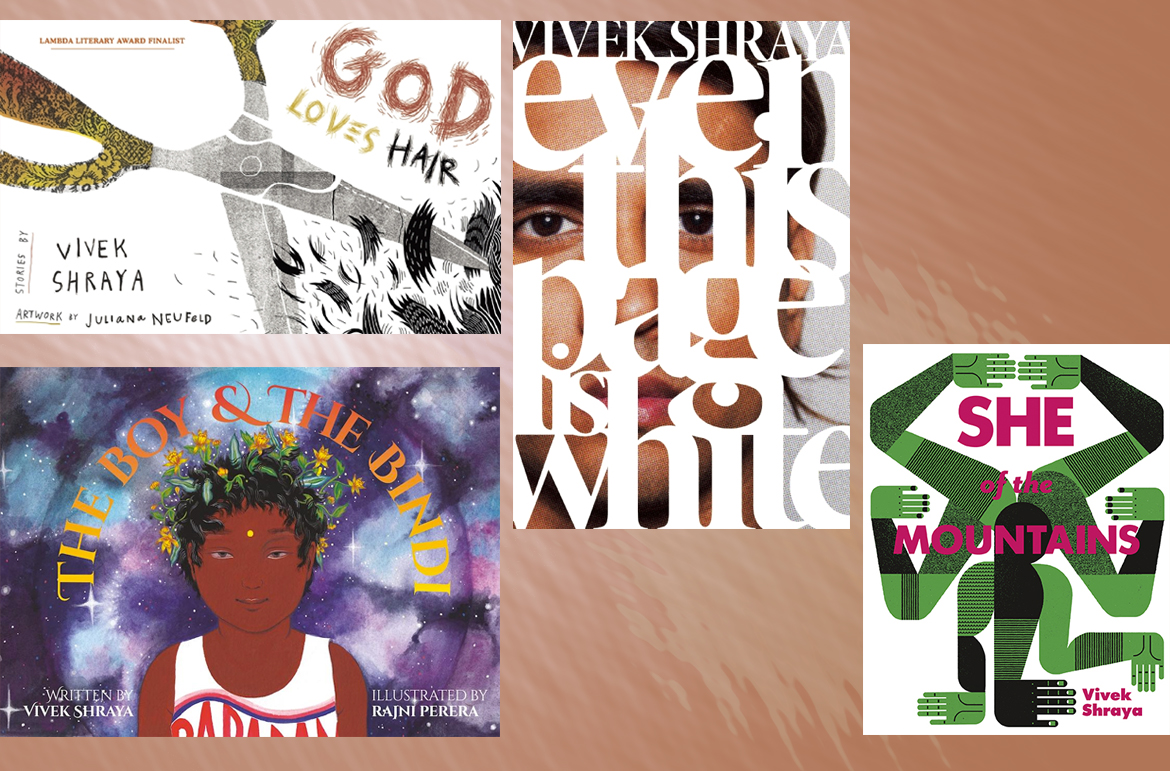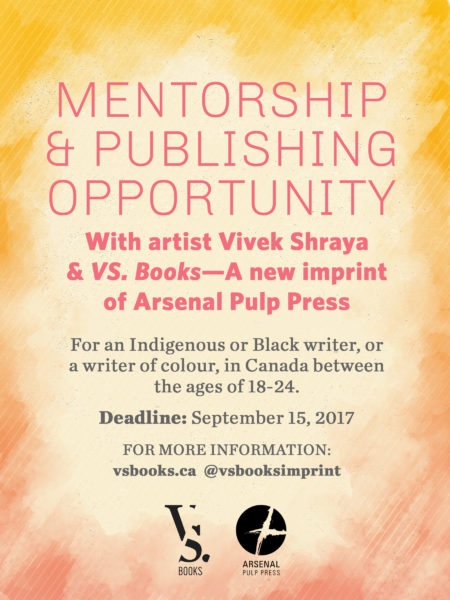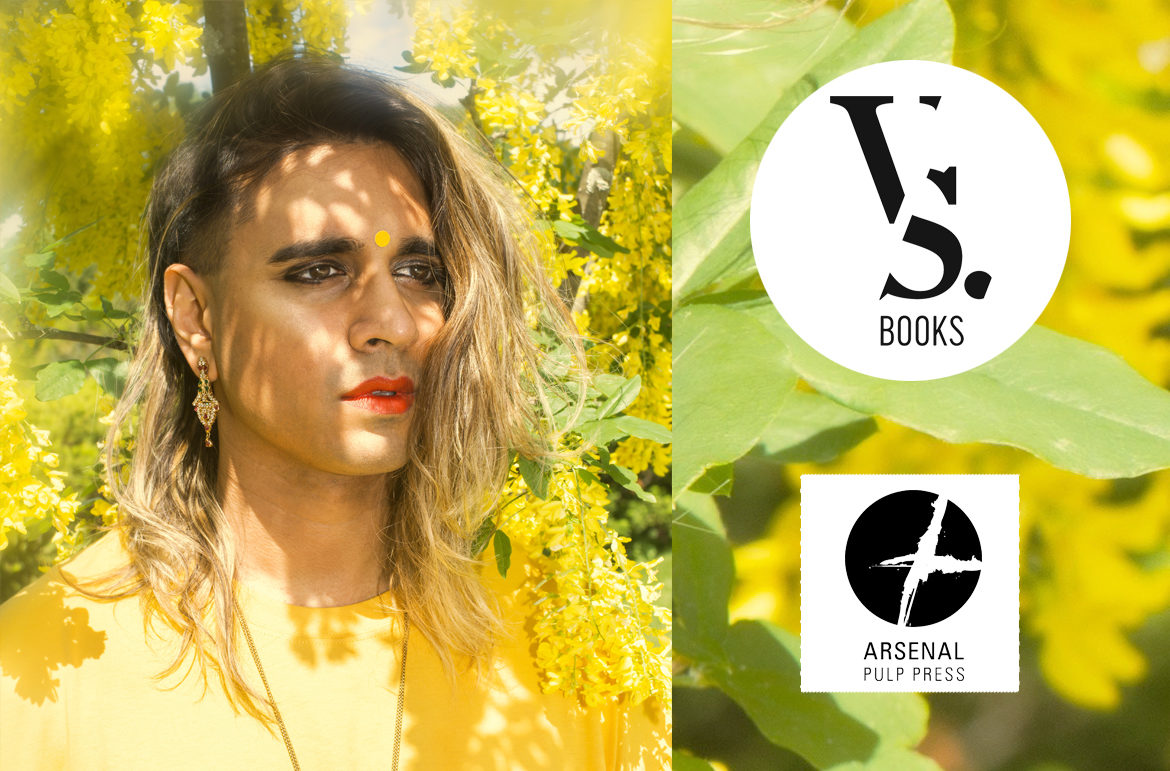The recently announced collaboration with Vivek Shraya and Arsenal Pulp Press is an imprint called VS Books—which includes mentorship and a publishing contract. Although Vivek’s self-publishing experience was important to her development as an artist, she recognizes the authority that traditional publishing holds. “Once Arsenal Pulp Press published a new edition of [God Loves Hair], people treated me with a different kind of respect, and the book was reviewed by mainstream outlets I wasn’t able to reach on my own.”
For Vivek, the journey to being a published author has not been linear. As a trans woman, Vivek faced (and still faces) a number of barriers as an artist. Passionate and unapologetic, she is a rising star with accolades in multiple art forms, including literature, music, film, and photography. The initial choice to self-publish her book was based on advice from other writers and on Vivek’s experience in the music industry. Vivek is now an established author, having published four books in four different genres, including a children’s book, poetry, young adult short stories, and an illustrated novel.

“When I self-published God Loves Hair [in 2009], it often not seen as a ‘real’ book and consequently I felt like a fraud as a writer. Many bookstores refused to stock the book and I was ineligible for many Canadian grants and awards, despite its success. I had also been pursuing a music career and after chasing record label interest for seven years, I was wary about doing the same thing in the literary world. Self-publishing felt like an opportunity to learn from my music mistakes and invest in my own work.”
“One of the best things self-publishing offered me was to diminish any sense of entitlement. I think many writers have all kinds of high expectations when they are published—from their publisher, the market and their audience—and it’s hard to have these misconceptions after being self-published.”
Although God Loves Hair was later reissued by Arsenal Pulp Press, the positive response “helped to affirm that I don’t always need an institution to legitimize my work, that there are many non-mainstream ways to produce and disseminate art, and there are audiences who desire this art.” These lessons were important for her to pass on to other young artists, particularly those who are people of colour.
Last year, Vivek launched a mentoring program to work with one young artist of colour for a full year on a project in any medium of their choosing. “Once the applications were submitted, I was so excited about everyone’s projects that I chose to amend the program to be able to work with a different artist each month. These projects included a community celebration website, a graphic novel, and a poetry book.”
The skills Vivek learned when self-publishing are precisely the tips that would be useful for emerging writers. “Self-publishing offered me an introduction into many aspects of the literary world as a result of having to be not only the writer, but my own publisher, publicist, and booking agent.”
“In reviewing last year’s program, I realized that the young writers I worked with consistently sought support around getting published. I wondered if, given this, the mentorship felt short or was unnecessary. But as I continued to imagine what a future mentorship offering might look like, I was drawn to the idea of marrying mentorship to publishing as a way to still offer information regarding the publishing industry at large. This included artistic production, i.e., how to market a book, how to use social media, how to plan a book tour, how to seek out an illustrator, how to stay motivated, how to know when a story is finished, etc. Many of these areas aren’t generally covered by an editor or a publisher but would be part of the mentorship.”
 With this nugget of an idea, Vivek approached Arsenal Pulp Press. She was buoyed by the knowledge that Arsenal was willing to take chances and already had a renowned backlist of LGBTQA+ literature. “Two summers ago, I pitched both a children’s picture book and poetry book to Arsenal, despite their submission policy explicitly stating they weren’t accepting these formats. A year later, they published both of these books! This is one example of the ways that Arsenal is continually willing to think outside the box. If anyone was going to get behind a mentorship and publishing collaboration for young IBPOC [Indigenous, Black, and people of colour] writers, it would be them.”
With this nugget of an idea, Vivek approached Arsenal Pulp Press. She was buoyed by the knowledge that Arsenal was willing to take chances and already had a renowned backlist of LGBTQA+ literature. “Two summers ago, I pitched both a children’s picture book and poetry book to Arsenal, despite their submission policy explicitly stating they weren’t accepting these formats. A year later, they published both of these books! This is one example of the ways that Arsenal is continually willing to think outside the box. If anyone was going to get behind a mentorship and publishing collaboration for young IBPOC [Indigenous, Black, and people of colour] writers, it would be them.”
For writers of colour who already face barriers to being traditionally published, helping them reach these outlets was important to Vivek. She has written before about her own struggle with the lack of role models and access to elders, but has also recognized and given thanks to the informal mentors she has had.
“I feel a responsibility to create space and supports for other underrepresented and emerging writers. Selfishly, mentoring young writers is also an opportunity for me to keep learning and growing through this exchange.”
The mandate of VS Books doesn’t specify a genre, form, or style. Vivek says she is “looking for writers that take risks, and for unpredictable stories.” Perhaps these writers will also embody a part of the imprint’s name: V.S. stands for the initials of Vivek Shraya, but Brian Lam, the publisher at Arsenal, also noted the way V.S. creates the double entendre of “versus,” which implies pushing against the norm.
Although Vivek has her work cut out for her as a mentor and editor, she isn’t slowing down anytime soon. She is at work on her second novel. And in her musical career, Vivek recently released an EP with the Queer Songbook Orchestra, Part-Time Woman, and her band with her brother Shamik, Too Attached, is working on their second album.
Hopefully she will also still have time for reading: “The best books I have read this year, so far, are Next Year, For Sure (Zoey Leigh Peterson) and Juliet Takes a Breath (Gabby Rivera).”

